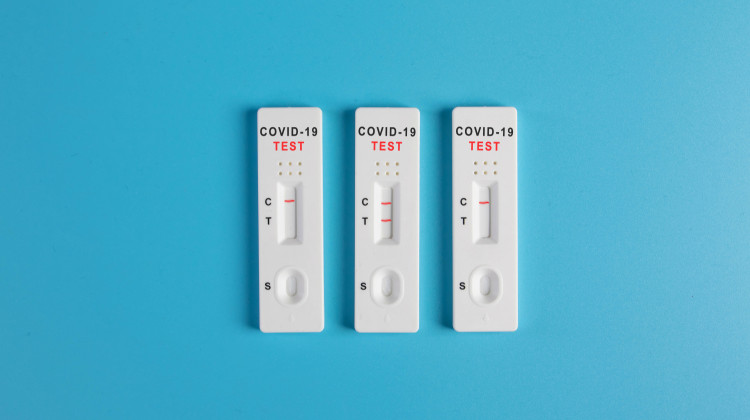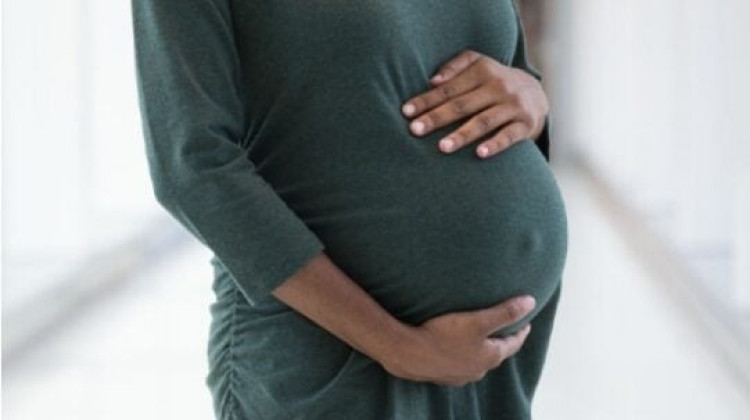As the omicron variant pushes COVID-19 case counts to new highs, Side Effects and Indiana Public Broadcasting have received audience questions about coronavirus treatments, including monoclonal antibodies.
To get answers to your questions, Side Effects Public Media’s Jake Harper spoke with Dr. Myron Cohen, a professor of medicine, microbiology and epidemiology at the University of North Carolina at Chapel Hill.
Want to join the conversation? Text “health” to 73224 to join Side Effects Public Media’s text group, The Midwest Checkup; and text “Indiana” to 73224 to join Indiana Public Broadcasting’s group, The Indiana Two-Way.
This interview has been edited for length and clarity.
Jake Harper: To start with something super basic: What is an antibody?
Dr. Myron Cohen: An antibody is the product of a cell called a B-cell. In the context of COVID, we'd like the antibodies to bind to the virus and neutralize it. The way an antibody neutralizes the virus is by preventing it from attaching to the cell it's seeking.

Harper: When we're talking about monoclonal antibodies, in terms of a treatment, how are these antibodies made, and who are they for?
Cohen: When people recover from an infection, they have made antibodies to try and get rid of the infection. So if we take people who've recovered from COVID, whatever the variant, we can get their blood and look to see how well their blood neutralizes the virus. And we know if it neutralizes the virus, the variant we're interested in, we can then look for the B-cell that made the best antibody in their blood.
So we're looking for people who are making super-duper antibodies and we search many, many thousands of people to find those who make the very best antibodies. We harvest a single cell that made the very best antibody. Then we make sure that cell can replicate in a test tube. Once the cell replicates in a test tube, you've got what's called a clone of cells. You can make any number of those cells and they're going to make the antibody you want.
We take that antibody that we've now made and we put it into an animal and we see if we can prevent the animal from getting SARS-CoV2, or can we treat the infection. If that happens, we can then do a phase I clinical trial [to] make sure the antibodies are safe in humans. Then we're ready for a clinical trial to prove that we can either prevent or treat COVID infection with a monoclonal antibody in humans.
The most important way to avoid becoming ill is to get two doses of an mRNA vaccine followed by a third dose a few months later. That gives you your own antibodies.

But not everybody's vaccinated – and some people who are vaccinated don't respond to the vaccines properly, especially those receiving cancer therapies or immune therapies. And we know for sure that the thing that works against you in this kind of 'lottery of doing bad' is age and other comorbidities: heart disease, lung disease, kidney disease. For people in whom we suspect progression of disease, which means you might get sick enough to be hospitalized, we would want to prevent progression of disease with these treatments.
Harper: Is this something that you're administering after someone has been infected, or is the idea to give monoclonal antibodies before someone gets infected with the virus?
Cohen: You can do either. For people who either have not been vaccinated or cannot respond to a vaccine who we think have been or will be exposed, we can do pre- or post- exposure prophylaxis. That's also called passive immunity. It's a very old idea.
Evusheld is the one that AstraZeneca is making that has been FDA-authorized for pre-exposure prophylaxis. And some others have been approved for post-exposure prophylaxis. But as the variants have arisen, Evusheld is right now our best preventive monoclonal antibody cocktail.
We have several combinations that have been made for COVID treatment, but as omicron has surfaced, it's limited the number that are appropriate. Right now, the most appropriate is a drug made by GlaxoSmithKline called sotrovimab.
So our monoclonal options right now are a little bit limited. They're out there, but they're in short supply.
Beyond those, we have a couple of antiviral pills. You have Paxlovid and molnupiravir. Paxlovid, made by Pfizer, looks like a pretty good drug, but it's in short supply.
And then beyond that we have the IV-administered antiviral remdesivir. We have lots of remdesivir, but that requires infusions over three days. So we have to bring people back three times.
All of this only really works if you bring people early in disease. We're trying to stop the replication of this virus in the nose before it's aspirated into the lungs and can cause more problems or cause more inflammation.

We don't have enough treatments that everybody gets treated, and the treatment is really provided to people at the greatest risk of progression.
Harper: Can you explain the difference between a monoclonal antibody treatment and these antiviral medicines you just mentioned?
Cohen: The monoclonal antibodies were made by harvesting a cell from somebody who is making an antibody that would block the virus from attaching to a cell. Paxlovid, the Pfizer drug, is what we call a direct-acting antiviral. It was designed to attack part of the replication system of the virus, called the protease. So there's a pretty big difference between the pills and the monoclonals and how they work.
Harper: Who pays for these treatments? Are people ending up with big bills?
Cohen: The government bought all the monoclonals we're talking about, they also bought all the pills we're talking about, and they bought all the vaccines we’re talking about. Right now, there's no charge because the government bought the entire supply and the distribution comes from the government. The government gives states all these drugs based on demand.
But let's be clear: We live in a capitalist society. As COVID goes from epidemic to endemic, eventually these companies will be selling these products at different costs. That will play a role in how well they're used.
Now, a drug like remdesivir — the government didn’t buy that. That was used as an inpatient antiviral drug, and is several thousand dollars, but insurance companies will pay for it, as will Medicaid and Medicare. And very recently, the government allowed remdesivir in outpatient treatment, thereby allowing reimbursement for the drug. So all this is really complicated once you get beyond the existing monoclonals and the pills.

Harper: As treatments like this have come out, some people may think, 'Well, there's treatment now. I'll just rely on that instead of getting a vaccine.' What would you say to them?
Cohen: Let there be no mistake about this: An ounce of prevention is worth a hundred pounds of cure. You don't want to get COVID-19. Even if we get super-duper treatments, they're not 100% effective, and we don't know whether they're going to have any effect on preventing long COVID: persistent cough and headache and symptoms that might last for months.
And they have to be given very quickly. So if you do develop what you think is COVID, you have to go out and get a test in order to qualify. And even if treatments are in copious supply and you can just get a prescription, you still need to go to the drug store and get the prescription and so on and so forth.
What you want to do is not get the infection. Try and avoid situations where you're indoors crowded with people and not wearing a mask. Masks work.
Get vaccinated. The two primary RNA vaccine doses of either the Pfizer or Moderna vaccines, followed six months later by a booster dose. That gives you pretty good immunity against all the variants.
Vaccines were never really designed to completely prevent infection. They were designed to prevent progression of disease that would lead to hospitalization and much worse illness, perhaps even an ICU stay.
Vaccination and masks are essential tools to be used before you even think about the new treatments. So I want to be unequivocal about that.
Harper: Since you mentioned long COVID, what do we know about omicron and long COVID?
Cohen: How common long COVID from omicron is relative to alpha or delta — I don't believe anyone knows. We don't know which symptoms will be dominant and how many people will get those symptoms.
For alpha and delta, we saw probably a third of the people were still ill at some level several months later. They still had a cough. They still felt somewhat confused. They still had fatigue. And recently there's been some concern in children about long COVID causing other problems — like in a small number of children, diabetes.
So we don't really understand everything long COVID can do, but the better thing is not to get COVID.
Let me be really kind of blunt about this: It is insensible to say, ‘I know that I might be able to get treatment and if I get sick, I'll go to some sort of an infusion clinic. The drugs that were working against delta won't work against omicron and we have no idea if those infusions will prevent long COVID. So the vaccines are unbelievably important, as are masks and distancing.
To find a monoclonal antibody treatment site in Indiana, call 211. This story comes from Side Effects Public Media — a public health news initiative based at WFYI. Follow Jake on Twitter: @jkhrpr.
9(MDAyMzk1MzA4MDE2MjY3OTY1MjM5ZDJjYQ000))
 DONATE
DONATE







 Support WFYI. We can't do it without you.
Support WFYI. We can't do it without you.